An Australian Goldendoodle is a crossbreed between an Australian Labradoodle and a Goldendoodle. Known for their moderate size, minimal shedding, and specific grooming needs, they make an exemplary choice for a variety of family types.”
This comprehensive guide will delve into the key aspects of owning this breed, including their full-grown size, shedding tendencies, and grooming requirements.
Whether you’re considering the Australian Goldendoodle as a new family member or just curious, read on to gain a deeper understanding of this distinctive breed.
Table of Contents
Overview of Australian Goldendoodle – What Should You Know?
Group:
Teddy Bear dogs
Breed:
Australian Goldendoodle
Weight:
15 – 65 pounds
Height:
14 – 23 inches
Life expectancy:
10 – 15 years
Coat type:
Can be curly, straight, or wavy
Color:
Golden, cream, red, merle
Characteristics
Rating out of 5
Affection level
Very affectionate
Friendliness
Very friendly
Kid-friendly
Typically good with older kids
Pet-friendly
Fine with dogs but might chase cats
Playfulness
Loves a game and trip to the dog park
Intelligence
Highly intelligent
Tendency to Bark
Sometimes
Amount of Shedding
Moderate to low
Characteristics
Affection level
Very affectionate
Rating out of 5
Characteristics
Friendliness
Very friendly
Rating out of 5
Characteristics
Kid-friendly
Typically good with older kids
Rating out of 5
Characteristics
Pet-friendly
Fine with dogs but might chase cats
Rating out of 5
Characteristics
Playfulness
Loves a game and trip to the dog park
Rating out of 5
Characteristics
Intelligence
Highly intelligent
Rating out of 5
Characteristics
Tendency to Bark
Sometimes
Rating out of 5
Characteristics
Amount of Shedding
Moderate to low
Rating out of 5
History
The Australian Goldendoodle was created on the back of the popularity of the Poodle crossbreeds back in the late 1980s. Originally, Doodles were bred as service dogs but soon became popular family pets, largely due to their low-shedding coats and excellent temperaments.
What Is An Australian Goldendoodle?
Australian Goldendoodle is also known as a Double Doodle and is a cross between an Australian Labradoodle and an English Goldendoodle. To produce an Australian Goldendoodle, F1 (first-generation) crosses of both parent dogs are mated.
The Australian Labradoodle
The Australian Labradoodle has more than just Poodle and Labrador genes. These dogs were originally bred with English and American Cocker Spaniels to produce a dog with a low-shedding coat. However, it’s thought that there are many other breeds in there, too.
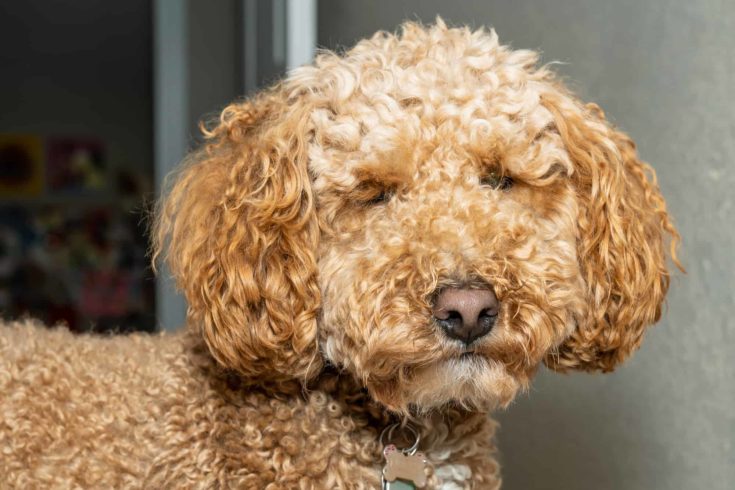
So, you can see that the Australian Goldendoodle is certainly a very mixed breed!
When compared with the Goldendoodle, the Australian Goldendoodle is slightly stockier in build.
Can You Train An Australian Goldendoodle?
Yes, Australian Goldendoodles are highly trainable! Their intelligence, eagerness to please, and food-motivated nature make them receptive to learning. This, combined with their adaptability, allows them to thrive in various training styles and environments.
With consistent, positive reinforcement training, you can build a strong bond with your Australian Goldendoodle and have a well-behaved and happy companion.
Licensing And Identification – Do I Need One?
Yes, in the US, unless your dog is a seeing-eye dog, a guide dog, or a service dog, you must have it licensed.
In fact, it’s an offense to not have your dog licensed each year. Failure to do so can see you being fined! Before you can get your Australian Goldendoodle licensed, you’ll need the following:
- Your dog’s current rabies vaccination certificate.
- Proof that your dog is neutered or spayed unless you’re a registered breeder.
Every dog must wear a collar carrying the following information:
- ID tags
- Licenses (if applicable)
- Rabies vaccination tags
Your dog’s ID tags must contain your name, contact telephone number, address, and your dog’s name.
Microchipping
Although having your dog microchipped is currently not a legal requirement in the US, I do recommend that you have your Australian Goldendoodle chipped.
Microchipping is a painless procedure that sees the microchip inserted underneath the dog’s skin. The chip contains the owner’s contact details, which are held on a computerized system. If a dog is handed into a police station, dog pound, or shelter, it is scanned for a microchip. So, if your dog is stolen or lost, you stand a very good chance of being reunited with your canine companion.
What are the Feeding Requirements of an Australian Goldendoodle?
Choose a high-quality kibble formulated for their size (medium or large) with a focus on their life stage (puppy, adult, or senior).
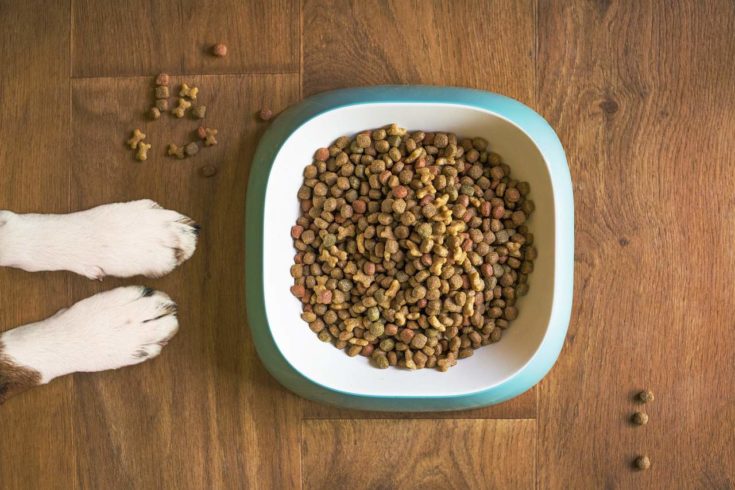
The amount of food will depend on their weight, age, and activity level, so use the food packaging’s guidelines as a starting point and monitor their body condition for adjustments.
Puppies need multiple smaller meals throughout the day, while adults generally do best with two daily feedings. Always provide fresh water, limit table scraps, and consider healthy treats in moderation.
If your Goldendoodle has allergies or sensitivities, consult your vet for a specialized diet plan.
How Much Food Do Australian Goldendoodles Need?
While all dogs need food amounts based on their weight, Australian Goldendoodles also vary in size (mini, medium, or standard), age, and activity level.
Start by checking the manufacturer’s guidelines on your chosen dog food, then adjust portions based on these factors. For instance, a mini Goldendoodle will need less than a standard, and a puppy more frequently than an adult.
The most important thing is to monitor their body condition (you should be able to feel their ribs without them being visible). Consult your vet for the most tailored feeding advice for your specific pup.
What To Feed Australian Goldendoodles
Wet Or Dry Food?
Senior dogs and young pups can do well on a diet that includes wet food, as that’s more comfortable to eat for dogs who have missing teeth and sensitive gums.
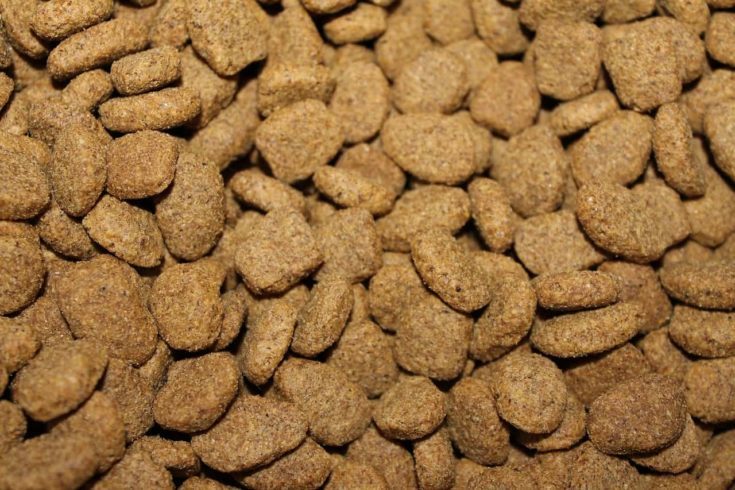
I recommend that you feed your adult Doodle dry food. Biscuits or kibble are perfect for scraping away bacteria from the dog’s teeth that would otherwise cause plaque, leading to gum disease and canine periodontal disease in the dog’s later years.
Your dog needs the following key nutrients in his diet to keep him healthy:
Protein
Your dog needs lots of meaty protein in his diet to maintain healthy growth and muscle development.
When choosing a food for your Australian Goldendoodle, make sure the diet contains at least two sources of protein that are derived from whole meat products. Take a look at the list of ingredients on the packaging, and you want to see that protein is the first item. Although many dog foods contain peas, veggies, and some pulses, such as lentils as a protein source, meat should always be at the top of the list.
Fat
Australian Goldendoodles derive the majority of their energy requirements from fat. So, the food you choose should include sources such as canola oil, chicken fat, and flaxseed.
Fatty acids are very good for your dog’s coat and skin and for the development of a puppy’s brain and eyes. So, look for Omega-6 and Omega-3 in the ingredients list.
Fiber
Like many Doodles, Australian Goldendoodles tend to have delicate tummies, so you need to make sure that your pet eats plenty of fiber.
However, avoid foods that are packed with cereals, which are added to bulk out the food and contain no real nutritional value. A better source of fiber includes vegetables and rice.
Carbohydrates
Like people, a high-carb diet is not ideal for dogs, as it can cause weight gain and the associated health problems that go with that. However, a small quantity of low-glycemic carbohydrates are okay as that won’t trouble your dog’s blood sugar levels.
What Not To Feed
Now you know what to feed your Doodle, let’s talk about what you shouldn’t feed him.
There are several items that are a big no-no when it comes to feeding dogs:
- Chocolate, which is highly toxic to dogs.
- Excessive treats that can cause tummy upsets and weight gain.
- Grapes and raisins, which cause kidney failure even when eaten in small amounts.
Although your dog would love to munch on a bone to get at the marrow contained within it, I would caution against offering your pet any form of natural bone. Many types of bones are prone to splintering, potentially sticking in your dog’s throat, causing choking or even tearing the intestine, which could cause fatal peritonitis.
What Grooming Procedures Does an Australian Goldendoodle Need?
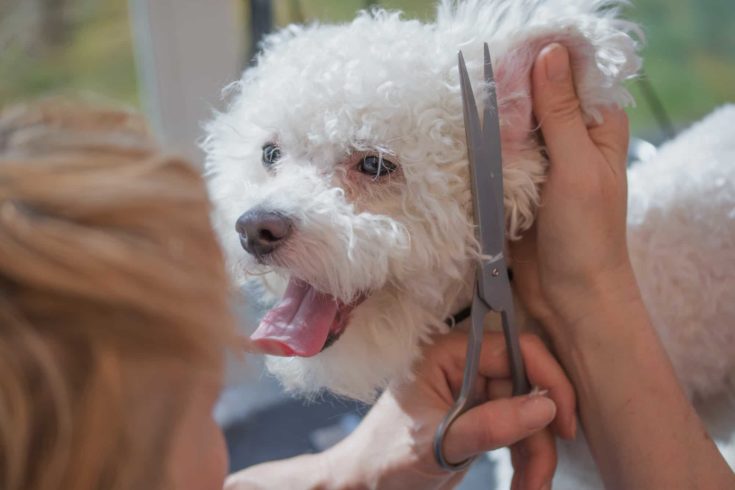
Australian Goldendoodles require regular brushing to prevent mats and tangles. A professional groomer can clip your dog every 6-8 weeks, but brushing at home is necessary in between.
You can bathe your dog occasionally, but avoid frequent bathing, which can dry out the skin. Use a high-quality dog shampoo and avoid human shampoo. Daily teeth cleaning is recommended to prevent dental problems.
Dental Care
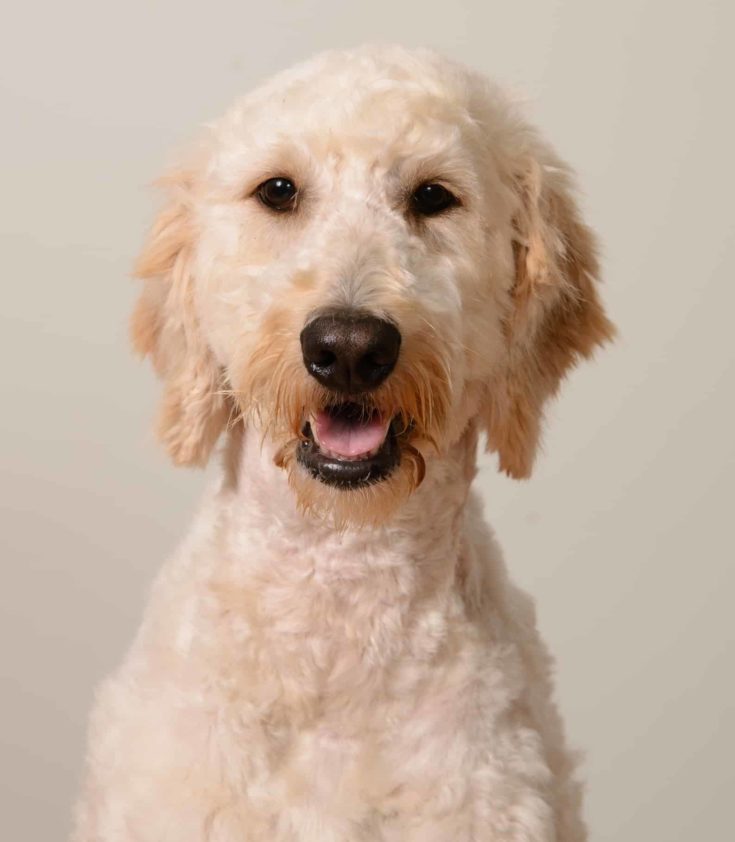
Just as with humans, if you don’t look after your dog’s oral health, he can develop serious dental conditions such as gum disease and canine periodontal disease. If your Doodle develops stinky “dog breath,” contact your vet immediately, as smelly breath usually indicates dental problems or some other serious health condition.
You should clean your dog’s teeth every day using a special dog toothbrush and pet toothpaste. Do not use human toothpaste on your dog! The formula for human toothpaste is not suitable for pets and will make your pup sick.
What does an Australian Goldendoodle need in its shelter?
Australian Goldendoodle needs a good quality, chew-resistant plastic bed with a comfortable, machine-washable bed to put inside the plastic bed. They also need a training crate, a selection of soft cushions and fluffy blankets, and puppy pads for house training.
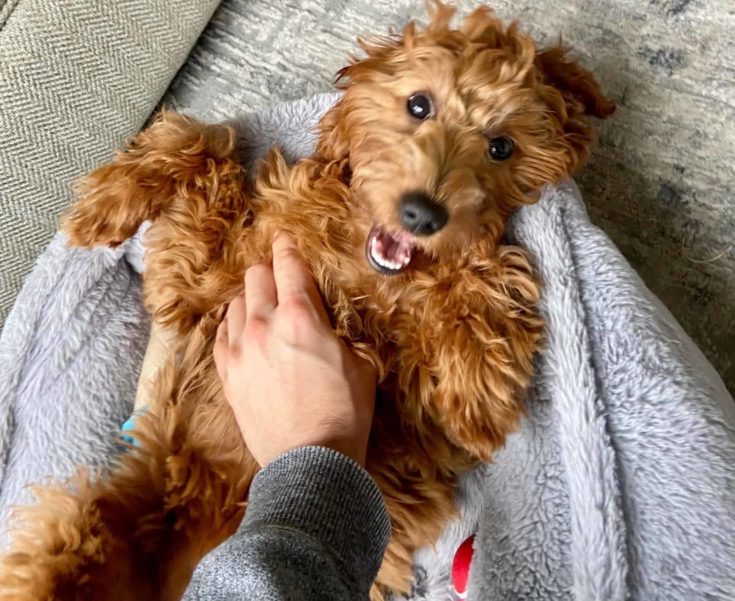
Important note: Australian Goldendoodles are very people-oriented and don’t do well left alone for long periods. Because of that, keeping them outside in a kennel is not recommended as it can cause separation anxiety and stress. A crate can be a useful tool for training a puppy and can provide them with a safe and secure space throughout their life.
What Your Australian Goldendoodle Will Need
For his comfort, your Doodle needs:
- A good quality, chew-resistant plastic bed.
- A comfortable, mashing-washable bed to put inside the plastic bed.
- A training crate.
- A selection of soft cushions and fluffy blankets.
You might also want to buy some puppy pads to use while house training your Doodle.
Physical Needs
Australian Goldendoodles are lively, playful dogs that enjoy plenty of exercise every day to keep them happy and healthy.
You can take your Doodle hiking with you, go to the dog park for some off-leash fun, and enjoy some fun and games in your backyard, too. Remember that this breed is very intelligent and loves to interact with people, so make time to play with your pet every day.
What Health Factors Should You Consider for Your Australian Goldendoodle?
Australian Goldendoodles are generally healthy dogs, but there are a few health factors to consider. These include hip dysplasia, elbow dysplasia, sebaceous adenitis, subaortic stenosis, Addison’s disease, progressive retinal atrophy, glaucoma, and cataracts. Breeders should be able to show you health certifications for the parents of the puppy.
Neutering/Spaying
Most breeders insist that you have your Australian Goldendoodle neutered or spayed. In fact, many ask you to sign an agreement to state that you won’t breed from your dog. That’s to prevent backyard breeding that could potentially produce puppies with genetic health problems.
There are a few other reasons for having your pet desexed:
- You can’t license your dog in most US states unless the animal is spayed or neutered.
- There are thousands of unwanted puppies produced every year, which is why shelters are overflowing. So, have your dog desexed to avoid unwanted pups.
- Entire male dogs have a habit of roaming looking for females. That can cause traffic accidents and untold mayhem in your neighborhood, so get your boy dog desexed!
- Australian Goldendoodles are pretty mellow characters. However, having your dog desexed can help to prevent straying, excessive barking, jumping up, and even aggression.
Parasites
One very important aspect of your Doodle’s care is a parasite control program. Sometimes, your dog will come into contact with other pooches that are carrying fleas, and he could easily pick up a tick or two if you take him hiking in areas where there’s long grass.
Dogs also have a nasty habit of eating whatever they can get their jaws around while you’re out and about. That can include slugs, scraps of food, dead animals, and even other dog’s poop! All those revolting snacks can contain worm eggs or larvae that could spell big trouble for your dog if he isn’t protected from these parasites.
So, you need to treat your pet with parasite medication that will prevent worms, ticks, and fleas from causing problems for your dog. Have a chat with your vet clinic for more information and advice on what products to use.
Vaccinations
There are several serious diseases that can infect and potentially kill dogs. So, you must have your dog vaccinated every year against the following diseases:
- Rabies (if it’s a problem in your region)
- Leptospirosis
- Lyme disease, especially if you take your dog wilderness hiking
- DHPP (distemper, hepatitis, parainfluenza, and parvovirus)
- Bordetella (Kennel Cough)
Note that all boarding kennels, daycare facilities, and most dog training and activity groups will not take your dog if he isn’t vaccinated up to date.
Common Health Problems In Goldendoodles
Like most crossbreeds, Australian Goldendoodles are generally pretty healthy and sturdy dogs. However, there are a few problems that can affect the breed.
Avoid Puppy Farms!
Puppy farms are usually backyard operations where puppies of particular popular and trendy breeds are churned out in huge numbers. The sole purpose of puppy farms is to make as much money as possible as quickly as possible.
Unfortunately, that means that the parent dogs are usually kept in terrible conditions, often without seeing the outside of a cage and being bred continuously. The puppies they produce are generally not vaccinated and frequently die or fall seriously sick within a few days of arriving in their new homes.
Sadly, many would-be owners are seduced by the cheap prices and sales patter of these unscrupulous breeders, which helps to fuel the industry. So, don’t buy a cheap Australian Goldendoodle puppy – it’s probably come from a puppy farm.
Licensed Breeders Are Best!
Always buy your puppy from a well-established, reputable licensed breeder that has a good track record of producing small numbers of high-quality Australian Goldendoodle puppies every year.
The parent dogs should both be DNA tested and health-screened for genetic abnormalities, and the puppies should all undergo veterinary health checks before going to their new homes.
What Genetic Health Conditions Are Australian Goldendoodles Prone To?
There are several genetic health problems that could affect your Australian Goldendoodle, including:
- Hip dysplasia
- Elbow dysplasia
- Sebaceous adenitis (skin disease)
- Subaortic stenosis (a heart condition)
- Addison’s disease
- Progressive Retinal Atrophy
- Glaucoma
- Cataracts
For both the puppy’s parents, the breeder should be able to show you:
- Canine Eye Registry Foundation certification
- Hip certification by the Orthopedic Foundation for Animals
- O.F.A. heart clearance
- D.N.A. tests for Progressive Renal Atrophy (P.R.A.)
- O.F.A knee clearance
Check out the Goldendoodle Association of America website for full details of the health screening requirements for the breed.
How Much Does An Australian Goldendoodle Cost?
Australian Goldendoodles typically start at around $2,600 and increase depending on the quality of the breeding of the puppy.
Most good breeding kennels and smaller breeders have a waiting list for their puppies. You’ll also need to undergo an application process and vetting before you will be permitted to “adopt” a puppy.
What Products Are Recommended For Australian Goldendoodles?
Here’s a list of everything that you’ll need for your Australian Goldendoodle:
- High-quality dog food and treats
- Food dishes
- Water bowls
- Toys, including safe chew toys
- Brushes, comb, etc.
- Nail clippers
- Collar with license and I.D. tags
- Harness for walks
- Leash
- Carrier (for small dogs)
- Crate for training and in-car transport
- Sturdy plastic dog bed with comfortable, washable lining
- Soft blankets and cushions
- Dog toothbrush and pet-specific toothpaste
- Puppy training pads
In Conclusion
If you’re searching for a loving, playful, and low-shedding companion, the Australian Goldendoodle could be the perfect fit for you! These dogs are exceptionally family-friendly, get along well with other pets, and are a good choice for those with allergies.
Their intelligence makes them highly trainable, but be prepared to match their high energy levels with plenty of exercise and playtime. Are you ready to welcome an Australian Goldendoodle into your life? If so, make sure to thoroughly research their specific needs, locate responsible breeders who prioritize health and temperament, and visit potential puppies to find the perfect personality match.
Remember, while Australian Goldendoodles bring immense joy, they also require a dedicated owner. If you’re ready to provide ample attention, love, and a commitment to their well-being, you might just find your new best friend in an Australian Goldendoodle!
If you enjoyed this article, please remember to share it! And don’t forget to tell us all about your Australian Goldendoodle!
